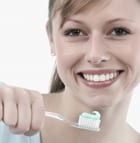Plaque in Weybridge: What It Is and How to Get Rid of It
 The soft deposit forming on the teeth’s surface is referred to as plaque. It is home to a variety of oral bacteria and actually forms a part of the teeth’s natural defence. However, if plaque is not removed, it can calcify and lead to periodontal or gum disease. For this reason, regular visits to remove calcified plaque by your Weybridge dentist are recommended.
The soft deposit forming on the teeth’s surface is referred to as plaque. It is home to a variety of oral bacteria and actually forms a part of the teeth’s natural defence. However, if plaque is not removed, it can calcify and lead to periodontal or gum disease. For this reason, regular visits to remove calcified plaque by your Weybridge dentist are recommended.
Considered to be a biofilm, plaque is mainly composed of Streptococcus mutans and other anaerobic bacteria like Actinobacteria.
Normally, these bacteria does not cause any harm but if the plaque is not removed, they undergo anaerobic respiration and start producing acid. This can lead to:
• Demineralization of the tooth which leads to dental caries
• Inability of saliva to penetrate the plaque build up preventing it from neutralizing the acid and re-mineralizing the tooth
• Irritation of the gums which could result to periodontal diseases
• Formation of calculus or tartar
Surprisingly, all these can be prevented since it is relatively-simple to get rid of plaque. Consider the following tips:
• Brush teeth least twice a day
• Floss teeth at least thrice a week
• Avoid eating foods and drinks high in refined sugar
• Use antiseptic mouthwash as part of your oral hygiene regimen
• Visit your dentist regularly for professional cleaning and routine check up
• Avoid smoking
By knowing what plaque is and how you can get rid of it, you are reducing your chances of suffering from periodontal or gum disease and other plaque-related oral condition.





